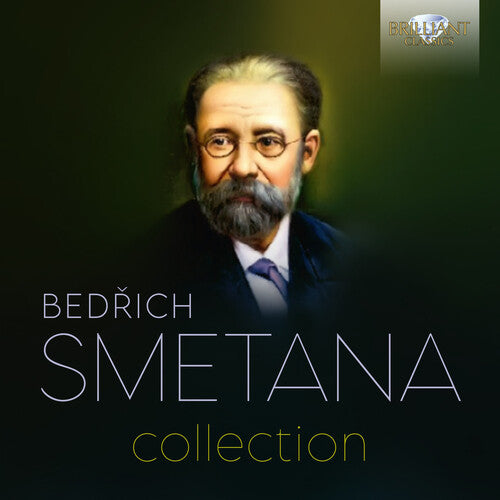Brilliant Classics
Smetana/ Plano/ Janacek Philharmonic Orchestra - Smetana Collection
Smetana/ Plano/ Janacek Philharmonic Orchestra - Smetana Collection
Usually ships within 1 to 2 weeks.
Couldn't load pickup availability
SKU:BRLT96909.2
Share
?The most complete collection available of music by the father of Czech nationalism in music. Má Vlast, The Bartered Bride and the String Quartet 'From My Life': all written within a decade of each other, all so fundamental in their different genres in forming a Czech national identity in music that it can seem incredible they were the work of a single composer. Yet this was the task that Bedrich Smetana (1824-1884) had set himself from early on - not only to become 'a Liszt in technique and a Mozart in composition' but the voice of a new nation. Given the obstacles he faced, his success in realising this ambition is all the more impressive. To begin with he had to overcome his father's antipathy to his chosen destiny as a composer; then the vicissitudes of poverty, and then, at the height of his powers and renown, a succession of personal tragedies which left him deaf and mentally unstable; he died in reduced circumstances, living with his daughter, and it took the following generation of Czech composers to rehabilitate the hero who had lived in their midst. To begin with, Smetana won a reputation as the life and soul of the party thanks not least to the kind of piano miniatures which were published as his earliest surviving works. He sent one set to Liszt, who replied with characteristic generosity, and the elder composer's example, encouragement and friendship all became crucial to Smetana as he spread his wings. Large-scale orchestral works soon followed in his late 20s, such as the powerful if rambling Festive Symphony - here performed complete, a rarity in itself - and the G minor Piano Trio, written as an outpouring of grief at the death of his daughter Bedriška, and a powerful foreshadowing of later masterpieces. Finding recognition in his homeland hard to come by, he moved to Sweden, and it was only on his permanent return home in the early 1860s that The Bartered Bride and then Má Vlast took shape, each through a complex genesis outlined by a new booklet essay and appreciation of the composer by Peter Quantrill. In their final forms they were acclaimed as the work of someone worthy to be hailed as a 'Czech Beethoven', for their heroic style, their mastery of old forms with a distinctively Czech twist, and their celebration of the nation's history and sense of itself.



